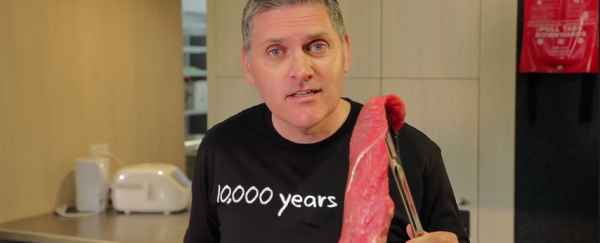Diet fads are nothing new, but over the past decade, the Palaeo movement has quickly gathered fans with the promise of solving a range of modern health problems by reconstructing the diet of our Stone-Age ancestors. While it definitely sounds nice, from an evolutionary point of view, it's an impossible dream, as evolutionary biologist Darren Curnoe from the University of New South Wales (UNSW) in Australia explains in the latest episode of 'How Did We Get Here?'
For starters, the Palaeo diet is based on misconceptions about the Stone Age, Curnoe explains, which really wasn't a great time. Most people died before the age of five, and very few people survived beyond 40. Our ancestors lived in groups of no more than a few dozen people, and shifted camps on average 60 times a year in order to feed themselves. Just imagine moving house more than once a week, every week, for your entire life.
Not only that, but due to a lack of evidence, scientists can really only make an educated guess as to the exact diets of our prehistoric ancestors. Curnoe explains that our best understanding of the Stone-Age diet is that it was highly dependent on the season and where people lived, with ancient humans exploiting foods as they became available and pretty much eating anything they could get their hands on.
The one thing we do know for sure is that there were no vegetarians back then, with some cultures getting 100 percent of their food from a range of wild animals. And that's all well and good, but if we tried to recreate this in our modern world, with seven billion (and growing) mouths to feed, we'd very quickly destroy the environment. It also might not be that healthy for us in the long-term with researchers finding links between red meat and cancer risk.
However, perhaps the most damning argument the video puts forward against the Palaeo diet is the fact that we've actually evolved past it. The invention of farming 10,000 years ago, and the change in our lifestyles and diets that came with it, altered our genes forever. And the large majority of the humans that live today are descendants of these early farmers, not cave men, so even if we wanted to go back and live like agriculture never happened, from a genetic stand point, it's not a possibility. Sorry, guys.
Watch the episode above to find out, from an evolutionary perspective, what we should be eating. As Curnoe so eloquently puts it: "In the end, the choices we make about what to eat should be based on good science - not some fantasy about a lost stone-age paradise that never actually existed." We couldn't agree more.
Love science? Find out more about the world-leading research happening at UNSW Science.
